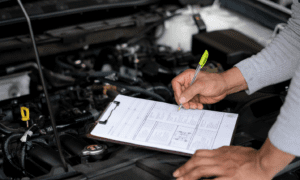Tesla claims that there is less governmental backing and asks the EU to reduce the 21% tax on EV imports from China.
TakeAway Points:
- Tesla argues for a duty level based on received subsidies in order to obtain lower EU taxes on EVs imported from China.
- The EU imposes higher tariffs on Chinese EV makers, with rates up to 38.1%, impacting companies like SAIC Motor and Geely Holding.
- In response to Chinese EVs’ competitiveness in undercutting European automakers such as Mercedes-Benz and Volkswagen, more tariffs have been implemented.
Tesla Wants Tariffs Reduced
Tesla Inc. has requested the European Union impose a lower tariff rate on its electric vehicles (EVs) imported from China, arguing that it has received less substantial state support compared to other manufacturers.
Olof Gill, a European Commission spokesman, confirmed that Tesla has asked for an individual examination that could lead to a duty level commensurate with the subsidies it has received. Other companies producing in China can also request such an investigation later this year to avoid a 21% levy on top of an existing 10% tariff.
Tesla’s CEO, Elon Musk, has been at the forefront of shipping EVs into the EU from China, utilizing the Shanghai factory as the primary hub for vehicle exports. While Tesla assembles Model Y sport utility vehicles in Germany, it imports Model 3 sedans into the bloc from the China plant. In 2023, Tesla delivered 947,000 vehicles from its Shanghai factory, with 600,000 going to the Chinese market and the rest exported, according to Chinese state media.
EU Implements Raised Tariffs
The European Commission announced on Wednesday that it would impose higher tariffs on Chinese EV makers, with state-owned manufacturer SAIC Motor Corp., the owner of British brand MG, facing a 38.1% additional tariff. The EU will apply a 20% duty on cars from China’s Geely Holding Group, the maker of Volvo and Polestar, and a 17.4% levy on BYD Co. vehicles.
EV producers in China that cooperated with the Commission’s investigation but weren’t part of the three-company sample will be subject to a 21% weighted average duty, while those that didn’t cooperate face the 38.1% rate.
Valdis Dombrovskis, the EU commissioner for trade, told CNBC that Tesla was making the case for lower tariff rates, which the commission was examining.
“We can also look more in depth into the specific situation of Tesla and subsidies [that] Tesla has specifically received in China, and that may lead to a different level of countervailing duties,” he said.
Effect on the Market
The move to raise tariffs comes at a time when many ultra-competitive and lower-cost EVs are undercutting European automakers like Volkswagen and Mercedes-Benz on their home turf.
The U.S. recently quadrupled tariffs on Chinese EV imports from 25% to 100%. In the EU, the tariffs were at 10% but now may go as high as 38.1%, according to the provisional conclusion reached by the body.
China is the world’s largest plug-in electric car market, with sales levels exceeding those of the rest of the world combined. During the first four months of the year, more than 2.5 million plug-ins were sold in the country, including 1.65 million EVs, accounting for 40% of the total volume. At the same time, Europe was under 1 million units, with 0.6 million EVs and a 21% plug-in share.



































